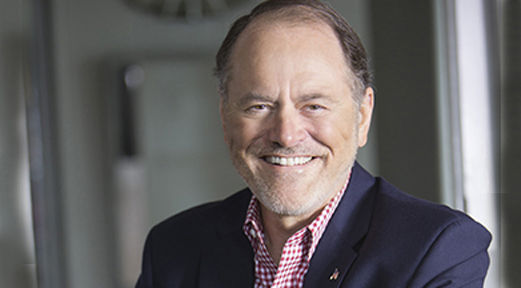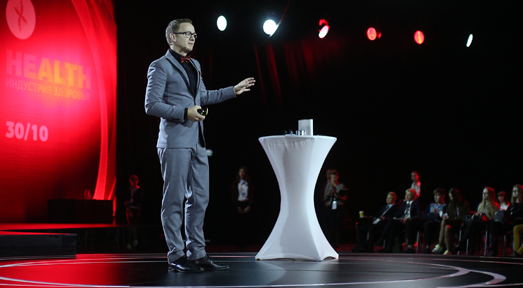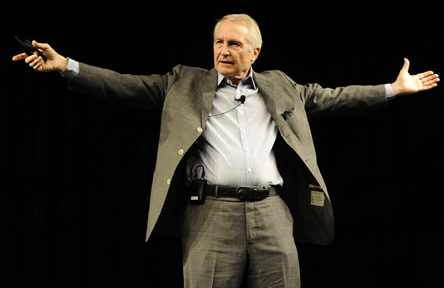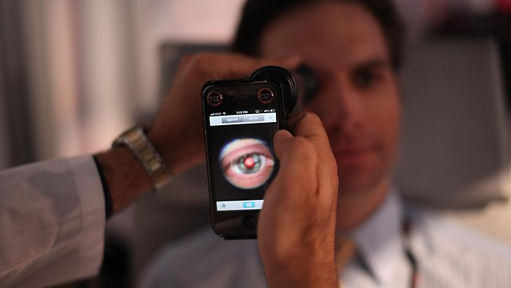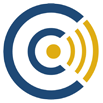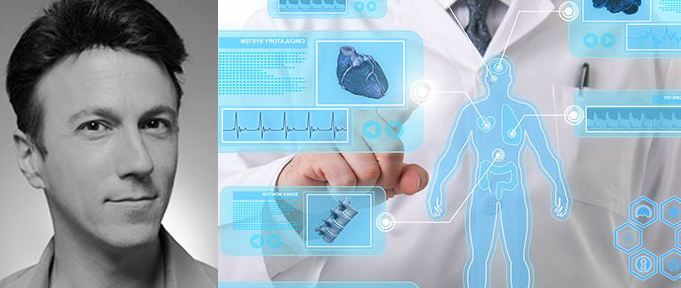
Healthcare Technology Future Trends with Dr. Daniel Kraft
 | What are some of the main challenges and opportunities facing healthcare today? |
 | We spend too much of our time and dollars on system inefficiencies, whether it's still using fax machines as our primary mode of communication or broken feedback loops that are part of clinical care, and folks who have preventable chronic disease.
Some of the biggest opportunities are to take many of the very rapidly converging and accelerating technologies and blend them together in powerful ways to change everything from how we do health and wellness, to diagnosis, therapy and even how we might think about discovery. |
| Consumers are becoming the CEO of their own health. You can now access more information and gain insights about your own conditions. And I think that empowers both the individual and the caregiver to have a more integrated experience. | |
| |
 | What are some of the main healthcare technology trends you see emerging within the next 10 years? |
 | I think there are a few big trends that are already starting to hit us. One of them is clearly the consumerization of healthcare; the fact that now most Americans (soon 80% of the planet) will be carrying around supercomputers in our pockets, IE: smartphones. These are really becoming medical devices and can leverage everything from helping you track your sleep to therapy adherence, all the way to becoming diagnostic test platforms for running your blood sugars or EKGs in a mobile basis. And that's just one example of how the individual consumer or patient can access their own information, be connected to healthcare providers and to social networks that can be very impactful and leveraged into health and medicine.
Consumers are becoming the CEO of their own health, and it's no longer the paternalistic pattern of "go to the physician, he may tell you what to do." You can now access more information; you can gain insights about your own conditions, whether that's your baseline genetics or your blood pressure or your management of more complex diseases like diabetes. And I think that empowers both the individual and the caregiver to have a more integrated experience. The second trend would be that of personalization. There's a lot of buzz around personalized medicine or the Precision Medicine Initiative; technology is going to enable that in more impactful ways. An obvious example would be consumer or personalized genomics. The price of sequencing a whole genome has dropped at twice the rate of Moore's Law. It was millions of dollars and took weeks to months, a decade ago, and now it's down to about $1,000, and soon will be less than the price of a standard x-ray. A third trend that layers on top of the first two would be the "Internet of Things" blending with the "Internet of Health". We're now well into the era of quantified-self type technologies. I think we'll move to an era where, just like our modern cars have a check engine light based on hundreds of sensors, we'll see some of that come to our health and medicine. We will be able to take signals from our social networks and from our wearable devices; things embedded in our clothes, in the refrigerator, in the mattress, and use those to give us useful, actionable information. I like to call that "predictalytics". Another meta trend I mentioned would be that most of crowdsourcing. We can now donate our genetic information, like with 23andMe–the sister of the 23andWe platform. I think we'll see more and more folks interested in becoming data donors, volunteering elements of their data or healthcare information, and, in exchange, getting something back. Hopefully, we'll see that sort of crowdsourcing and participatory medicine spread between academic groups and electronic medical records. Whereas today, a lot of that information is siloed and not very accessible, that's going to shift. The Apple Watch, for example, has a fair number of health sensors in it. But what was more interesting for me during that announcement was the Apple ResearchKit, which is a layer on top of Healthkit but it's going to transform how we do clinical trials. You can now download from the Apple Store, six or more different clinical trials. It enables, again, the citizen to become a participatory contributor to healthcare innovation. And I would imagine pharmaceutical companies and others in the future, pushing or making available trials to folks who are candidates, and they will benefit potentially from being in the trial, and speeding up the path to, whether it's a new drug or a new app, or a new platform across different elements of health and medicine. 3D printing is another impactful trend. We're already in the era where most hearing aids and technologies like braces are 3D printed. We're going to see 3D printing emerge into orthopedics. There are already earlier versions of implantable hips and knees that can be based on the patient's anatomy. It may even be your own 3D printed cardiac stent to match your anatomy, all of which is really possible today, but it's going to become much more applicable across different elements of health and medicine. |
| I think that the meta opportunity here–with this blend of sensors, big data, artificial intelligence, and personalized OMEX–is to move us from being intermittent and reactive to being more continuous and proactive. | |
| |
 | How can new healthcare technologies help solve our current healthcare issues? Are there one or two that are particularly stand out for you? |
 | Most of our healthcare systems around the planet are designed to be intermittent and reactive, meaning the data that we acquire from our patients or ourselves as individuals, is intermittent. I think that the meta opportunity here–with this blend of sensors, big data, artificial intelligence, and personalized OMEX–is to move us from being intermittent and reactive to being more continuous and proactive. Continuous meaning we'll be able to, in some cases, monitor, and in some cases, predict and prevent diseases, and have that almost in real time, whether that's from your mobile phone in your pocket, which can today, already help track and manage everything from depression to cardiac disease. |
 | Can convergent technology trends be leveraged to change the practice of medicine? |
 | Well, in many ways, medicine has been practiced in the old way of thinking for hundreds and sometimes thousands of years. But it takes culture change and shifting of incentives and governmental policy to get some of these things to really change the practice of medicine. For example, electronic medical records, which many physicians love to hate, have almost sort of blossomed with Obama Meaningful Use Incentives in the last few years.
I think as we see these tools become more integrated seamlessly into the physician workflow, using technologies ranging from Google Glass and other forms of augmented reality, to using artificial intelligence to help make sense of the means of new data that are available, we'll start to see that physicians and other healthcare providers find that these have a value, and improve the quality and efficiency of their care, improve outcomes, it can even improve the patient-doctor relationships. When incentives are aligned, meaning a physician who's no longer paid fee-for-service, their pay is getting bonus by having better outcomes, we'll see these become utilized. And again, that's often about understanding the culture and misaligned incentives. |

